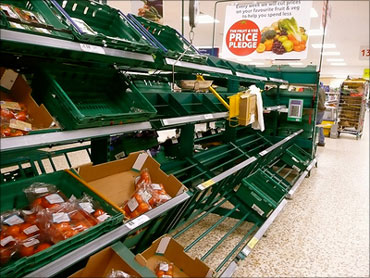
The number of people living in poverty has risen to more than 44 million worldwide since just June 2010. Overall, close to 3 billion people live on less than $2.5 (about Rs 110) a day.
Even as half of humanity struggles to figure out where its next meal might come from, the latest World Bank report dedicated to food prices is also not encouraging at all.
In four months from October 2010 until dsklfjhfwagjkl'wajgJanuary 2011, food prices have seen a sharp increase. Global inflation has accelerated in most regions.
Inflation in the Eurozone last year averaged 2.7 per cent. In the United States, where economists have long feared the existence of deflation, the annual price increase in March amounted to 2.7 per cent as well.
Emerging economies also show a hefty food price increase. In India, consumer prices over the past 12 months increased by nearly 9 per cent, while in February this number was at 8.3 per cent.
Annual inflation accelerated in China as well and amounted to 5.4 per cent.
So what is going to happen to our world when hundreds of millions more people cannot afford to feed themselves?
Most people are so accustomed to supermarkets that are packed with massive amounts of really inexpensive food that they cannot even imagine that life could be any other way.
Unfortunately, that era is ending. Here are 19 reasons why a harsher global food crisis looks real and imminent ....
...
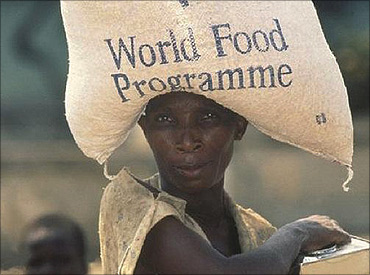
According to the World Bank, 44 million more people around the globe have been pushed into extreme poverty since last June because of rising food prices.
Volatile food prices have their most crushing impact on the poor who generally spend a greater proportion of whatever income they possess on food than do other segments of society.
In the poorest households many are now paying 15 per cent more for food than they did last year.
Some developing countries have found it necessary to expand their 'safety nets' to support the most vulnerable among the poor as they deal with the impact of rising prices.
Some households have adopted their own corrective measures to confront the problem: buying less food, eating fewer meals, reducing or suspending some expenses (for example, on health), borrowing more to meet their bills and, where opportunities exist, earning at multiple work places.
Such opportunities are limited, however, and the inevitable result is that the poor, already weighed down by their circumstances, are compelled to carry ever-increasing burdens.
...
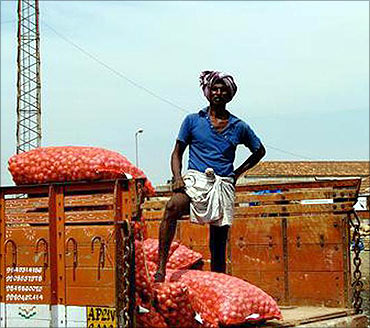
India is dealing with an annual food inflation rate of about 8 per cent currently, although it is much lesser now than the 18 per cent food inflation the nation faced till some months ago.
The rise in food inflation has been mainly on account of 58.58 per cent rise in prices of vegetables in the wholesale market.
Among the individual items, onion became dearer by 82.47 per cent on annual basis, while egg, meat and fish became costlier by 20.83 per cent, fruits by 19.99 per cent and milk by 19.59 per cent.
Today, India's inflation is rising at a fast pace and it is the lawmakers' biggest concern.
There is uproar in Parliament as political parties jostle to grab as much mileage as possible from the government's apparent failure to curb runaway inflation, as they try to sidle up to the aam aadmi who has been worst hit by skyrocketting prices.
...

According to the World Bank, the global price of food has risen 36 per cent over the past 12 months.
The current spike in prices is being caused primarily by increases in the cost of sugar and, more importantly, cereals, according to the International Food Policy Research Institute.
The price of wheat in particular has risen sharply. This is because wildfires last year in Russia, which accounts for 11 per cent of global exports, resulted in an export ban.
The recent floods in Australia, which also accounts for 11 per cent of global exports, has compounded the problem.
The price of corn has also risen, because of greater support for biofuels in the US and the increased price of oil, which makes biofuels more attractive.
Droughts in Argentina, the world's second-biggest exporter of corn behind the US, have also pushed the price up.
...

The commodity price of wheat has almost doubled since last summer.
In Shandong Province in northeastern China, the nation's grain heartland, the worst drought in 60 years has raised the specter of shortages for the world's largest wheat producer.
Russia -- still reeling from a drought that slashed wheat harvest by nearly 40 per cent and spurred Moscow to ban exports last summer -- hopes new, resilient strains of the crop will lead to a resumption of wheat exports.
However, soil damaged by the drought means nearly 10 per cent of Russian wheat fields could not be planted this year.
...
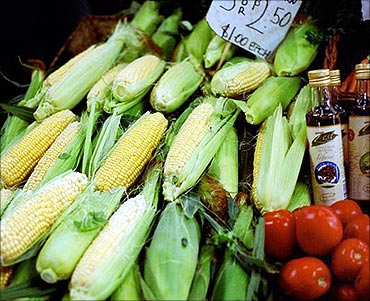
The commodity price of corn has also about doubled since last summer.
The United States recently released a report documenting that the current US corn stocks are shockingly low, in fact the lowest in 15 years.
The US said supplies have dwindled over the past month because of rising demand, largely from ethanol producers.
...
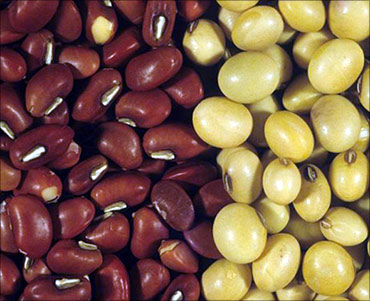
The commodity price of soybeans is up by about 50 per cent since last June.
Prices of vegetable oils and oilseeds may gain as much as 15 per cent in the next three months as supply trails growth in demand from China and India, as well as biofuel needs from the European Union.
Higher cooking-oil costs may worsen record global food inflation as prices of sugar, grains and oilseed top levels reached in 2008, when accelerating food prices sparked riots from Haiti to Egypt.
Governments from Beijing to Belgrade are boosting imports, limiting sales or releasing stockpiles to curb food inflation.
...
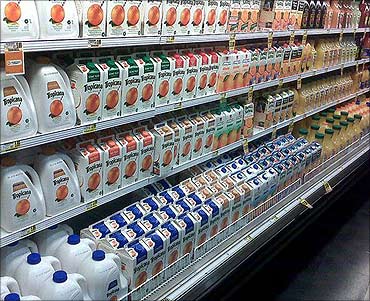
The commodity price of orange juice has doubled since 2009.
A series of bad harvests from Florida, America to Shandong Province, China, combined with increased demand from Asian countries, has forced up the price of orange and apple juice on the world market. Supermarkets have started to react by pushing up the price of a carton of juice.
Experts predicted factory prices could rise by as much as 80 per cent for orange juice and 60 per cent for apple juice in 2011.
This would place further pressure on retailers to increase the price of orange and apple juices on shop shelves even though they have already gone up sharply.
...

Due to ethanol subsidies in America, almost a third of all corn grown in the United States is now used for fuel.
This is putting a lot of stress on the price of corn.
...

One third of the world's cropland is losing topsoil faster than new soil is forming through natural processes.
On average, the planet is covered with little more than 3 feet of topsoil -- the shallow skin of nutrient-rich matter that sustains most of our food and appears to play a critical role in supporting life on Earth.
The estimate is that the world is now losing about 1 per cent of its topsoil every year to erosion, most of this caused by agriculture.
The United Nations has warned of worldwide soil degradation - especially in sub-Saharan Africa, where soil loss has contributed to the rapidly increasing number of malnourished people.
Healthy topsoil is a biological matrix, a housing complex for an incredibly diverse community of organisms -- billions of beneficial microbes per handful, nitrogen-fixing fungi, nutrients and earthworms whose digestive tracts transform the fine grains of sterile rock and plant detritus into the fertile excrement that gave rise to the word itself.
As such, true living topsoil cannot be made overnight.
Topsoil grows back at a rate of an inch or two over hundreds of years.
...

Water tables all over the globe are being depleted at an alarming rate due to 'overpumping'.
According to the World Bank, there are 130 million people in China and 175 million people in India that are being fed with grain with water that is being pumped out of aquifers faster than it can be replaced.
...

So what happens once all of that water is gone?
A combination of climate change and poor resource management is leading to water shortages in even the most developed countries.
Some of the world's wealthiest cities - such as Houston or Sydney - are using more water than can be replenished.
What is more, wealthy countries continue to use up the water of the developing world. The production of clothing, fruit, vegetables and even jewellery all need water.
And the demand for cheap produce often encourages wasteful use of scarce water resources. In the United States, the systematic depletion of the Ogallala Aquifer could eventually turn 'America's Breadbasket' back into a 'Dust Bowl'.
...

Diseases, such as UG99 wheat rust, are wiping out increasingly large segments of the world food supply.
An epidemic of stem rust on wheat caused by race UG99 is currently spreading across Africa, Asia and into Middle East and is causing major concern due to the large numbers of people dependent on wheat for sustenance.
The strain was named after the country where it was identified (Uganda) and the year of its discovery (1999).
It spread to Kenya, then Ethiopia, Sudan and Yemen, and is becoming more virulent as it spreads.
Scientists are working on breeding strains of wheat that are resistant to UG99.
...
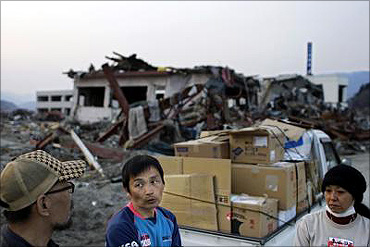
In fact, there are many that believe that eventually a significant portion of northern Japan will be considered to be uninhabitable.
Not only that, many are now convinced that the Japanese economy, the third-largest in the world, might even collapse as a result of all this.
...
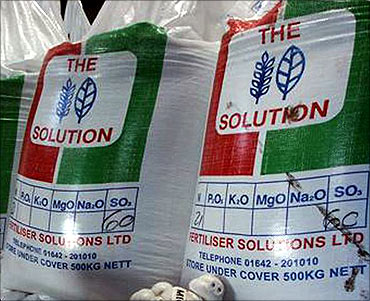
The world is not going to have enough phosphorous to meet agricultural demand in just 30 to 40 years.
Phosphorus is used extensively for a variety of key functions in all living things, including the construction of DNA and cell membranes.
As it is relatively rare in the Earth's crust, a lack of phosphorus is often the limiting factor in the growth of plants and algae.
In humans, it plays an essential role in bone formation.
Without a steady supply of this resource, global agricultural production will face a bottleneck, and humankind's growing population will suffer a serious nutrition shortage.
...
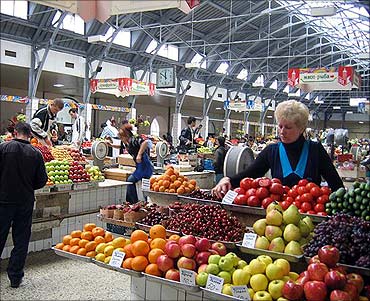
There have been persistent rumours of shortages at some of the biggest suppliers of emergency food in the United States.
If price of crude oil stays above $100 a barrel, it would drastically increase prices for seed, feed and fertilizer, with a dramatic impact on virtually all food prices.
...

It is being projected that there will be no more wheat production in Saudi Arabia by the year 2012.
Due to a lack of water, some countries in the Middle East find themselves forced to almost totally rely on other nations for basic food staples.
...
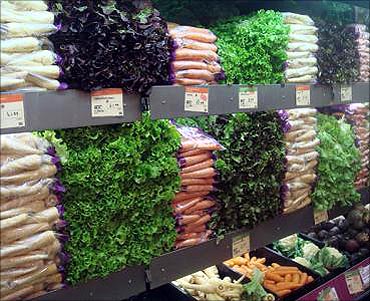
The price of oil may be the biggest factor on this list. The way that we produce our food is very heavily dependent on oil.
The way that we transport our food is heavily dependent on oil.
When you have skyrocketing oil prices, entire food production system becomes much more expensive.
...

2011 has already been one of the craziest years since World War II.
None of this is good news for global food production.
...

...
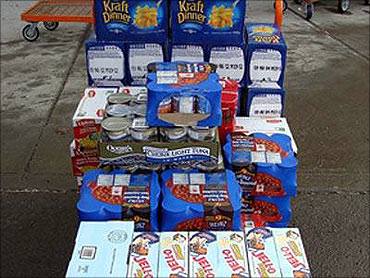
It means that time is short.
For years, many 'doom and gloomers' have been yelling and screaming that a food crisis is coming.
Well, up to this point there hasn't been much to get alarmed about. Food prices have started to rise, but the truth is that our stores are still packed to the rafters will gigantic amounts of relatively cheap food.
However, you would have to be an idiot not to see the warning signs. Just look at what happened in Japan after March 11. Store shelves were cleared out almost instantly.
It isn't going to happen today, and it probably isn't going to happen tomorrow, but at some point a major league food crisis is going to strike.
So what are you and your family going to do then?
You might want to start thinking about that.